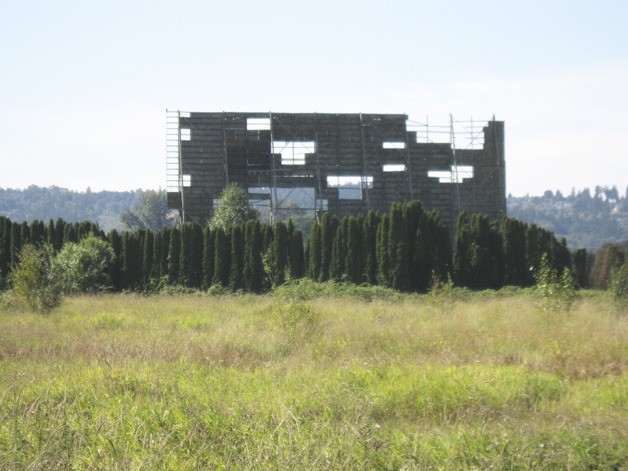The sign out in front of the Valley 6 Drive-In Theaters says, “closed for the season.”
Events under way right now, however, might soon tell if the Valley 6 – one of only six of its kind remaining in the state – has shown its last picture show.
An ordinance and a master development agreement between the owners of the property, the Robertson Properties Group, and the City of Auburn specifying how the site is to be developed, is making its way through various City subcommittees to an up-or-down City Council vote, possibly by this fall.
Council approval would allow the RPG to begin offering about 70 acres of property, that is, the Valley 6 site and several adjacent properties at the city’s north end, for office, retail and residential development.
Before that happens, however, people will get a chance to say just what they think about such a scenario at 7:30 p.m. Monday during a public hearing before the City Council.
The RPG, a family-held company, buys private movie theaters and properties throughout the country and develops them into something other than cinemas. Now the time on its agenda has come to move forward on the Auburn site.
The Auburn Gateway Project site plan included in the MDA shows a multi-phased development of 720,000 square feet of retail, 500 residential units and/or up to 1.6 million square feet of office space. It also calls for an extension of I Street Northeast north to South 277th.
For years, the City has negotiated with the RPG on future development of the acreage, touching on preparation of an environmental impact statement, changes to the comprehensive plan and zoning code to authorize a mixed-used commercial zone, and preparation of a draft development agreement and a draft planned action ordinance.
Deal’s details
In the development agreement, which lays out development guidelines, the RPG has agreed that the layout and uses of the Auburn Gateway Project will follow these strictures:
• Other than common areas, parking and access, no multiple family residential uses will be allowed on the ground floor of any building but only in upper stories of multi-story buildings.
• It shall contain more full-service, sit-down restaurants than fast food, including drive-thru restaurants
• Gas stations and car repair service and parts business will only be built as part of a larger retail operation.
Councilman Rich Wagner spoke about some of the protections embedded in the agreement for the developer and the City.
“It’s going to be a phased-development, so the developer needs to be able to react to market changes over a period of time, about 15 years,” Wagner said. “So he wants certainty that the C4 commercial zoning land-use regulations will remain the same over that 15 years. As for the multi-use buildings, where you have residential above and retail below, they are fairly new on the books and are not tested much in this city, so he wants to be sure those will remain available to him over those 15 years.
“The protection for the City is that every five years, the vesting sort of re-ups. If we pass some things in the meantime, such as new traffic impact fees, he would see the new ones for the next five-year period. That’s a protection for the City, so that if economics change, we have a chance to correct those during the 15 years,” Wagner explained. “However, he has complete certainty that he will be able to build certain kinds of buildings there with a certain amount of parking space and a certain amount of roadway that are part of the C4 regulations. That’s … very helpful to him in attracting tenants.”
This will mark the last time that City Council members ever act in a quasi-judicial role, that is as decision-making judges on land-use issues. Several years ago, council members took themselves out of that process, assigning the duty to the City’s hearing examiner. Took themselves out, that is, except for this one application, which was vested more than a decade ago.
An MDA, which the City no longer allows, provides for special zoning, the establishment of special planning areas and an agreement where both sides have to receive value for it to be put through.
The vested rights doctrine generally refers to the idea that a land use application will be considered only under the land use statutes and ordinances in effect at the time of the application’s submission.


